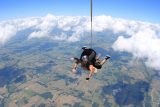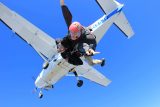Did you know that one of the most common causes of skydiving injuries is invisible? It’s true. One of the most common injuries suffered by skydivers, contrary to popular misconception, isn’t even visible to the naked eye–and it’s totally preventable. Protecting your ears from an injury on a tandem skydive is pretty simple stuff, and we want to make sure you’re forewarned and forearmed with the information–so here it goes!
1. Be prepared.
From the roar of the plane engine to the whoosh of relative wind in freefall, a skydive is a noisy adventure! Expect (and come prepared for) high decibels. Just like you do when you’re going to a concert, you know that it’s best for your health if you arrive prepared for the loud noises that you know are coming. While everyone experiences high decibels differently, we’ve found that tandem skydiving students often find it helpful to bring a pair of trusty earplugs along with them to the dropzone. Don’t worry, by the way. Wearing earplugs on a tandem skydive won’t take the edge off the experience. It’ll just make sure that it’s your happiness–not your ears, that the jump leaves ringing!
2. You’re empowered to take charge!
Regulate your ear pressure on the way to altitude. If you’ve ever been scuba diving, you’ll know that clearing your ears is an important ritual on the way down; when you’re skydiving, even though the need is, for the most part, less acute–remember to regulate on the way up. This is easy to forget, especially if you’re nervous!
3. Got a cold? Don’t jump!
Are your sinuses congested? Battling a head cold? Living with an ear infection? Do yourself a big favor and reschedule your jump. These illnesses often cause the eustachian tubes–which connect the middle of each ear to your throat and nose–to be blocked up, and a blocked eustachian tube can’t do its job properly. Here’s how it works.
When you’re in a skydiving airplane rapidly climbing up to exit altitude, you’ll be moving from the ground–where the air molecules are thick–to the upper atmosphere, where those molecules thin out. You’ll notice that, just as it does on a commercial flight, the air pressure against your eardrums will decrease while the pressure in the inner ear remains constant. The eardrum bulges outward in response, reducing the clarity of your hearing and causing discomfort. Under most conditions, this isn’t harmful.
Frequent instances, however, may compound to cause further complications–as can severe, acute instances such as when you decide to make a skydive when you’re congested. When the tube is blocked, symptoms develop because the pressure behind the eardrum is different than the pressure outside of your eardrum, and the eardrum may puncture from the pressure. While the result is usually not permanent hearing loss, it’s viciously painful.
For these and several other reasons, we recommended that you refrain from skydiving if you’re dealing with sniffly issues. You’ll enjoy your skydive much better when you’re feeling well, anyway!





